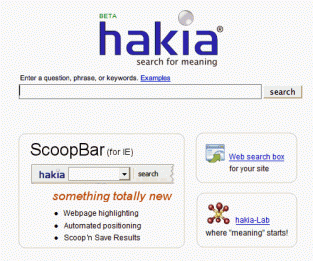Keywords or questions: is the difference really that remarkable?
**Keep this in mind: Anyone familiar with the game of Jeopardy knows that an integral part of getting the answer right is the ability to quickly frame it as a question….
A couple of sources I’ve recently read have tried to make a valid argument against any seamless implementation of a semantic or natural language web. An arugument? People are trained to keyword search. I hesitate to consider really the root of their beef–are they saying we won’t make the shift from phrases to questions? That’s the bare bones difference between a keyword (Google-type) search query and a natural language (Hakia, Powerset) search query. Query being the actual thing you type into the search field, the “prompters” intended to stir up the information for which you’re looking.
Okay, I know that journalists and pundits are in the biz of creating talk, the more controversy the better, but an arugment like this–that we’re already patterned to work in a keyword inspired environment, just seems lame to me. It also relegates our species back to that of caveman. Remember the Jeopardy rules…
Steven Pinker, in his brand new book, The Stuff of Thought, argues that even as children we are driven to instinctively emulate simple to complex language patterns even well before we have formal instruction. Linguistic pattern as a right of belonging, as part of our human-ness, is elementary, it is fundamental in our collective DNA.
So, NO, we’ll catch on quickly if and when a natural language engine rises to the top. AND if our businesses rest on it, you better believe the learning curve will be short-lived. I mean look at AdWords….when it first launched only the very maverick web marketers and SEOs took to it–were able to instantly rope and tie it. But now, just a few years later (and, yes, many millions of businesses make their money from it) it’s an absolute essential component in any savvy business strategy. If people can learn: how to build a marketing strategy with AdWords, how to navigate and sell everything on eBay, and shop for anything online, then casting a search query in natural language, framed as a question, seems quite….um, natural.
Filed under: Internet, Language, linguistics, Semantic Web | Tagged: keywords, linguistics, natural language search, patterns, steven pinker | 1 Comment »





